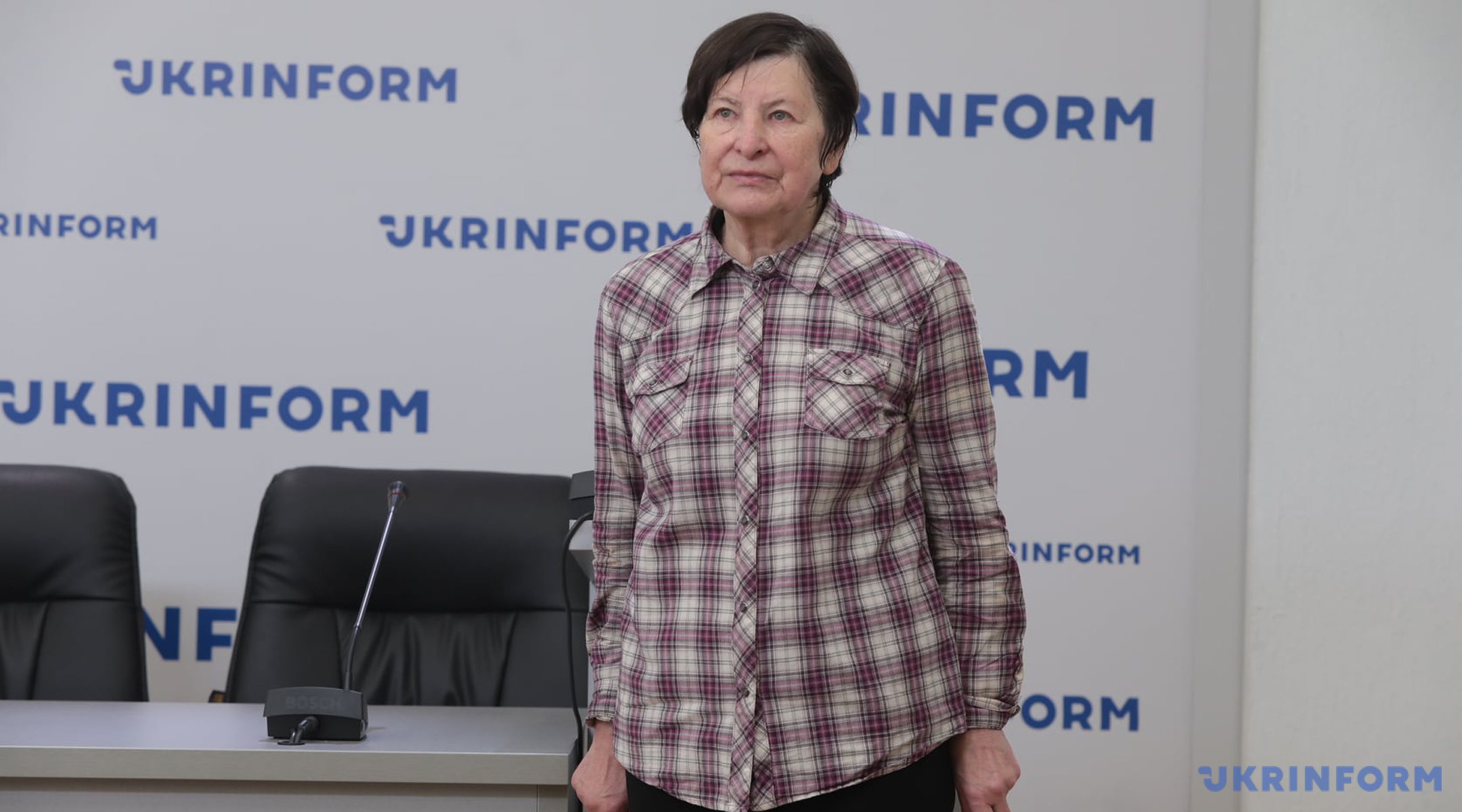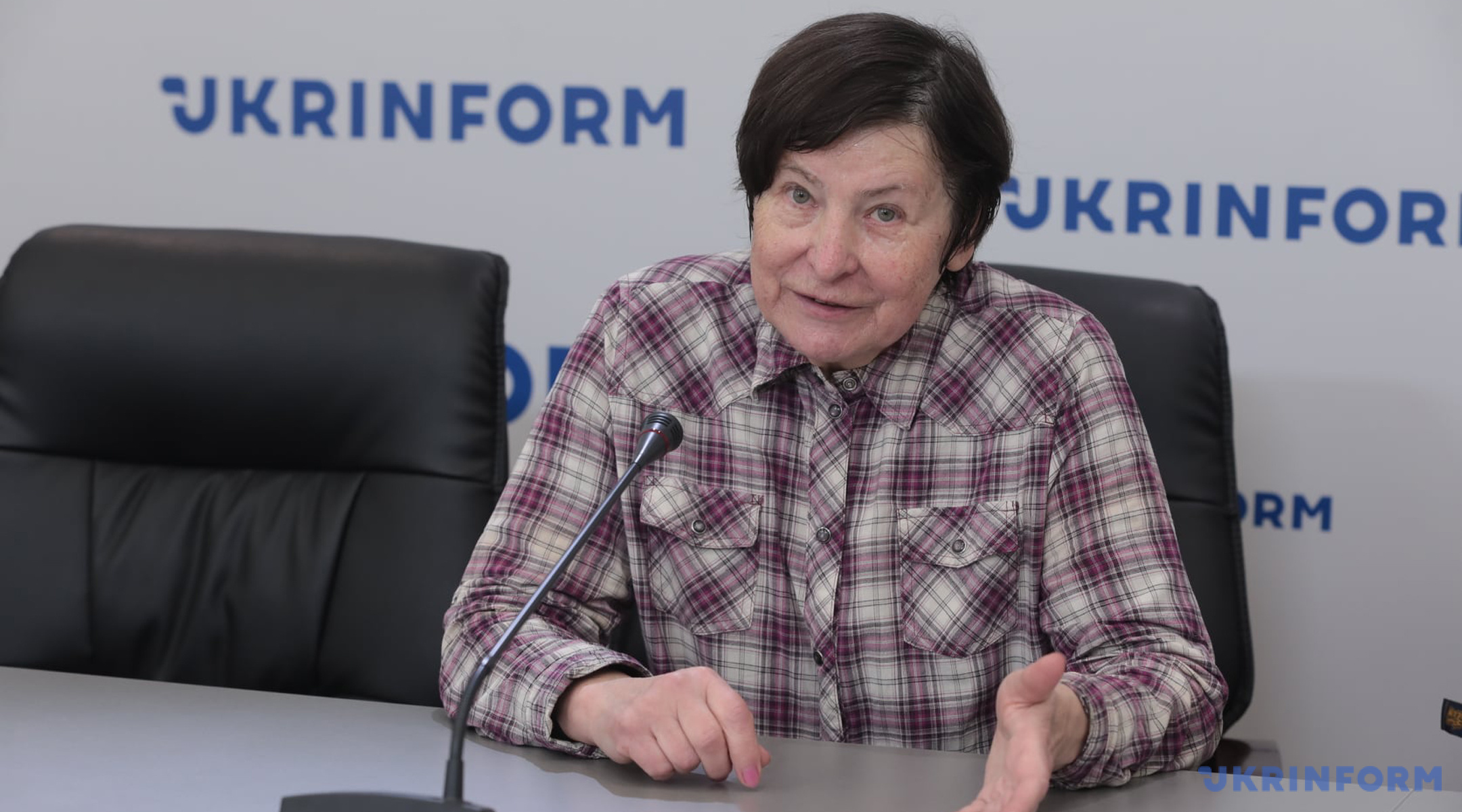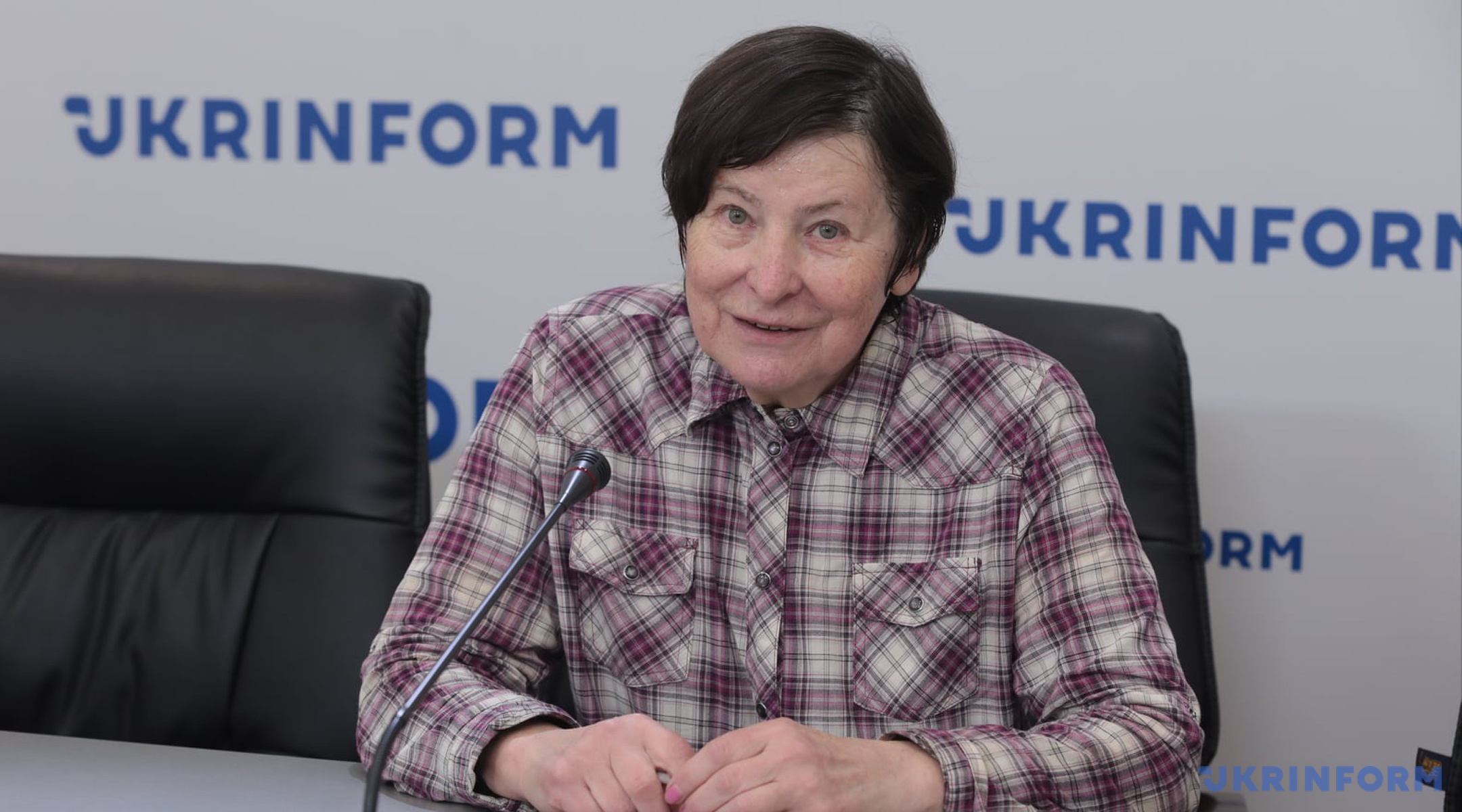Anastasia Mukhina of Luhansk thought her life on retirement would be calm and secure, to which end she had made great efforts. When the pipe factory where she worked stopped paying wages, the woman went to work abroad. Whatever money she made, she invested in home renovation. She could not have imagined that one day, all this would be taken away from her. By the time Russia unleashed the war in Donbas, Anastasia had already been retired. But this didn’t prevent her from waging her own struggle for Ukrainian Luhansk.
"BULLDOZERS WERE SWEEPING THE BODIES AND DYING ONES "
- What do you remember from the period when the occupation of Luhansk began?
- In 2013, the Russians flooded Luhansk, they were everywhere, they stood openly by the tents set up outside the regional council, the city executive committee, hoisting Russian flags. And when the time came in 2014, Crimea was annexed and grabbed by Russia, and the next day I read on the Internet that all local products are already being produced marked as Russian.

After the referendum, multiple Grad MLR systems were deployed in Luhansk on Thirty Years of Victory Street. I could see them from a hospital window. Then terrifying shelling began ... From early July, there was no electricity, no water. Every day, people would walk to get water, coming under fire. I walked 10 kilometers every day to get 25 liters of water.
I used to ask militants plenty of questions. I approached them in such a way that they told me things. One day I saw a militant sporting a military uniform and flip-flops running, his eyes terrified. I tell him: “You will be detained by a patrol. Why aren't you wearing a proper uniform? ” He tells me: “Lady, I saw things… I don't even know!.. I need some alcohol to stifle it. A bulldozer was sweeping the bodies of both the dead and the dying. The driver, who initially agreed to do this, refused but was forced to do it anyway, at gunpoint. It's something better not to be seen."
- When did you personally realize that something needs to be done?
- In 2014, I started writing leaflets saying Ukraine will never give up on us, that this is Ukrainian land and we must fight for it. I distributed them through mailboxes. I could walk into any apartment block as electric locks didn’t work due to blackouts. I also posted leaflets on poles and drew yellow and blue stripes.
"I KNEW FOR MYSELF THAT I WOULDN'T TELL ON ANYONE, WHILE YOUNGER ONES MAY NOT STAND THE TORTURE AND REPORT ME..."
- How did you start cooperating with Ukrainian intelligence?
- In early 2015, on my way home from the bank, I chatted with a woman on the bus. She worked with the Ukrainian military, so I left her my number. After a while, our intelligence operatives called me up and we met.
I showed them on the tablet where the military and equipment were deployed in the area, adding that I need more leaflets. And they say: "But you’re already of such an age ..." I replied: "It’s okay, I can still do a lot. Because for me, it is disgusting and unacceptable that Russian boots trample our land."

In addition to distributing leaflets, I was asked to pass data on the location and movement of forces and military hardware across the city and, if necessary, to travel to Krasnodon (now Sorokine - ed.), to Mykolaivka, settlements across the region. So I would pass all this information to them. They wanted to introduce me to other people who worked for the Ukrainian Army. But I refused because I know for myself that I won’t tell on anyone, while some younger ones may not stand the torture and report me.
I came up with an idea how to pass intelligence to my handlers. It was something about the dachas, vegetable gardens, and so on. We agreed on the codewords. There were basically two Russian brigades operating from the area so I had to keep an eye on them. So sometime in February 2015, I started working with the military.
- So you had been helping Ukrainian intelligence for three years. How did you let down your guard? What happened?
- On February 8, 2018, I had some leaflets left over and on the same day I received a text message saying that I could get my pension. So I took my pension and went on. I thought no one would notice me posting leaflets at the far corner of a residential building and recorded this on my phone. But someone working for a local anti-terrorist unit saw me. Me taking pictures caught his eye so he chased me down... I put the leaflets inside a book. He asked me what I had in my bag. I said it was a book. And then he snatched my bag, looked inside and saw these leaflets and my phone... That’s how I got detained. And from February 8 to February 10, they were interrogating me.
- And where was this happening?
- They were interrogating me in my own room. Hands behind my back, cuffed. They said: “You don't want to confess? Now we’ll hang you on the door by your hands." They hung me, but then someone called them. They took me off and asked again: "Go on, confess." My arms were twisted so bad that one still hurts terribly at times...
I wrote that I could confess to what I was caught on - the two leaflets that I posted. Yes, I had postcards in the room, but that I allegedly found them. Yes, I did possess explosive material, but I didn’t take it anywhere. But neither the investigator nor the court paid attention to this. Of the thirteen, there are six counts I was charged and sentenced on.
- You spent two years in prison. What was it like?
- In almost two years, 680 days that I spent there, I only spent about two weeks outside my cell. They take you out for a walk - it's the same cell because you see the same people you're there with, only the bars are on top. And from above, militants are watching over you. When I was taken to court, I wasn’t provided any medicines, not allowed to go to the bathroom. And then they would take me by the collar of my coat and throw me into a paddy wagon so that I hit my head on the door - since then I’ve had this scar.
When we were taken out for interrogation or to a courtroom, we were brought to a room where we were told to completely undress. So we stayed there naked, forced to squat. Three squats for me and five for others. They did the same with women and men.
I was taken out for an interrogation twice a week. It was a Chechen man who interrogated me. They didn't beat me with their hands, but they threw me against the wall so hard that I slid down it...
It was impossible to eat there. Only the outer layer of bread was properly baked, so there was this watery substance inside. The porridge they gave us would turn rock solid in five minutes. And when they brought us borsch, it stank so bad that it was impossible to stand this ...

"WHEN WE WERE SWAPPED, THERE WERE NO PASSPORTS ON US, EVERYTHING WAS TAKEN AWAY"
- Do you remember the day of the swap, December 29, 2019? How did the government take care of you after that?
- I was met by my neighbor's daughter. I was given some stuff, a phone that I could only use to place a call. I didn't have any ID on me either, because everything, except my employment papers, was taken away ...
Then our physicals began. We were taken to the gynecology unit in Feofania Clinic and I asked that we be tested first for viral diseases, AIDS, tuberculosis. After all, all kinds of people were held there who knows what kind of diseases they could have.
- Have you received UAH 100,000 in assistance to political prisoners?
- I was one of the first to get this UAH 100,000. During my rehabilitation, I was temporarily housed in a dormitory at 77 Lukyanivska Street. But soon the lockdown began, and then the owner of the dormitory changed – so I was simply thrown out. For two years I’d been living in hostels and rented a bed, until I achieved the promised spot in another dormitory.
This is a room with four beds without amenities. To get to the kitchen, you need to go to another place. To shop, I had to go down the stairs from the fourth floor, and back then I was still using a cane... And still, that was temporary accommodation. Everything that the government did was give me a hundred thousand, a passport, and that's it. Everything else I do at my own expense.
It’s been a while, but we still have no official status so we are treated as internally displaced persons. These are the people who took their belongings when they were moving to the government-controlled territory of Ukraine and at any time they can return to the occupied territory to check on their property left behind, see their parents’ graves. We have no such opportunity. This is how we’re different from IDPs. We do need a certain status.
- Is there anything else you need?
- Understanding. I have heard more than once from civil servants who tell me in private: “But what were you doing there anyway? Why did you go where you weren’t asked to? Who do you think you are?” I always tell them: “What was I supposed to do? Watch the invader go on occupying more territories? I am a citizen of Ukraine who can't stand that someone is moving into your house, that you are being evicted and trampled on. And if it weren't for us and the military we were helping, the invaders would have already been at our border with Poland."
Iulia Horban, Kyiv
Photo by Hennady Minchenko
im
